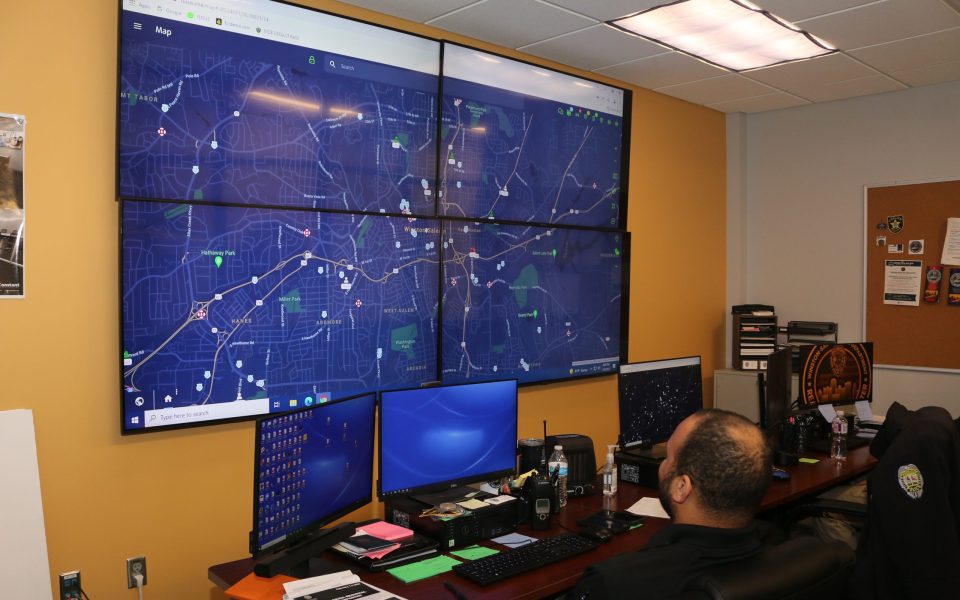Featured photo: Winston-Salem’s Real Time Crime Center (courtesy photo)
The city of Winston-Salem and Forsyth County are once again recipients of the Edward Byrne Memorial Justice Assistance Grant, a Department of Justice formula grant program that funds state and local criminal justice initiatives.
The grant bears the namesake of Edward Byrne, a 22-year-old NYPD police officer who was shot and killed in 1988 in Jamaica, Queens while guarding the home of a Guyanese immigrant and witness in a drug case against dealer Howard Mason.
This grant program is available each year to eligible governments and organizations. This year the grant is offering up to $102.8 million for direct allocations to eligible applicants.
According to the North Carolina Criminal Justice Analysis Center’s 2019-22 Byrne JAG Strategic Plan, Byrne JAG funds awarded to a state may be used to provide additional personnel, equipment, supplies, contractual support, training, technical assistance, and information systems for criminal justice, including for any one or more of the following:
- Law enforcement programs
- Prosecution and court programs
- Prevention and education programs
- Corrections and community corrections programs
- Drug treatment and enforcement programs
- Planning, evaluation, and technology improvement programs
- Crime victim and witness programs (other than compensation)
- Mental health programs and related law enforcement and corrections programs, including behavioral programs and crisis intervention teams
Under the current arrangement in the agreement, the Winston-Salem Police Department and the Forsyth County Sheriff’s Office will split the funds with each entity receiving $140,315.50. The city’s Public Safety Committee and Finance Committee recommended this move on August 14 and 15, respectively, and the item goes to city council on Monday for the final decision.
In an email to Triad City Beat, Assistant City Manager Patrice Toney wrote that the city chose “law enforcement programs” as their focus area.
“This is the area typically selected, as it applies to most equipment purchases and is considered a broader area than most spending purposes fall under,” Toney stated.
Toney stated that the city plans on using their share of the grant funding to purchase audio/visual technology for the police department’s Vivian H. Burke Public Safety Center auditorium. This technology will include large video display panels as well as audio and video/teleconferencing systems, Toney specified, adding, “all of which are necessary for meetings, presentations, training events, and potential critical incidents that require large-scale coordination and response.”
According to Public Information Officer Christina Howell, Forsyth County Sheriff’s Office will be using their portion of the funding to continue covering the cost of the operating platform for their Real-Time Intelligence Center.
“The enterprise solution allows for a common operating platform that does not require replacement of current equipment at video transmitting locations that the FCSO has access to view, save, and analyze in a Cloud-Based System,” Howell told TCB in an email. “These transmitting locations consist of any FCSO owned/placed cameras, as well as business cameras located throughout Forsyth County where the owners have permitted the Sheriff’s Office access. The enterprise solution allows for 10TBs of storage in a Cloud-based solution, including the extraction and unification of live video, data, and sensor feeds. This allows for enhanced situational awareness and improved investigative capabilities via the FCSO RTIC.”
Where has the money gone in years’ past?
Toney explained that each year, WSPD Chief William Penn and his assistant chiefs review the agency’s “current list of funding needs, which are items not budgeted in the current fiscal year,” and then identify which items they would like to request in the JAG grant application.
- In 2006, the city used grant funds to purchase software specialized for public safety solutions such as computer-aided dispatch and records management, and simulated training equipment for ongoing officer training within the police department.
- In 2009, the city used $130,310 to purchase mobile digital video recorders and mobile radios.
- In 2017, WSPD received $84,875 and used it to purchase a server for storing digital evidence; radio scanners; surveillance equipment; and crime analysis software.
- In 2021, WSPD received $118,746 and used it to purchase replacement vehicles for its Investigative Services Bureau.
All CityBeat reporting content is made possible by a grant from the NC Local News Lab Fund, available to republish for free by any news outlet who cares to use it. Learn More ↗
Republish this storyJoin the First Amendment Society, a membership that goes directly to funding TCB‘s newsroom.
We believe that reporting can save the world.
The TCB First Amendment Society recognizes the vital role of a free, unfettered press with a bundling of local experiences designed to build community, and unique engagements with our newsroom that will help you understand, and shape, local journalism’s critical role in uplifting the people in our cities.
All revenue goes directly into the newsroom as reporters’ salaries and freelance commissions.


Leave a Reply